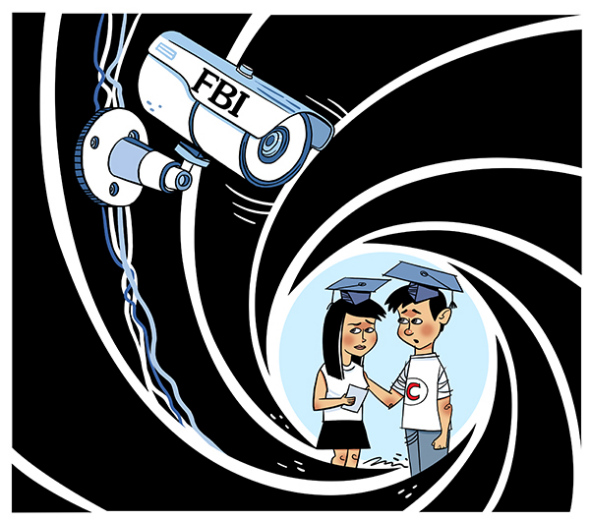
(Cartoon: Shi Yu/China Daily)
Following a deadly Florida school shooting, that resulted in 17 deaths, including that of a Chinese-American student who held the door to let classmates escape, we learned that the FBI received a tip-off about the shooter last month, but failed to act.
The FBI was probably too busy with other threats, such as Chinese students in the United States, who, according to Elizabeth Redden on the website of Inside Higher Ed, could be spies. In a piece titled "The Chinese Student Threat?", published on Feb 15, Redden wrote that FBI's director Christopher Wray told a Senate panel that the U.S. academic sector is naïve about the intelligence risks posed by Chinese students and scholars.
I was red with anger reading the piece, as Redden portrays all Chinese students and scholars in the U.S. as a risk to its national security. It is hard not to take this personally. Although sometimes I wish my life was that colorful. "The name is Fang, Berlin Fang."
Then you would see on the screen something like 007. The truth of course is much less interesting. In my case, the reality is I have devoted the better part of my working life training people to use educational technology, such as Canvas, Respondus Lockdown Browser, Screencast-o-matic. I have also translated American literature into Chinese, and I write for Chinese media about the things that I observe in the U.S. as a way of making my small contribution to promoting goodwill between the two peoples. I also have kids making pledges of allegiance to the American and Texas flags.
Now, all of a sudden, it seems we are suspected of being spies.
Redden wrote another piece for Inside Higher Ed, titled "China's 'Long Arm'" that was published on Jan 3. Part of the evidence she put forward for China's reach was Professor Kevin Carrico twice discovered, in his six years of teaching, that something he taught in class about sensitive topics was reported in China and then back to him. Therefore, the assumption was there were spies in his class.
Carrico should probably be informed that Chinese students use the social media app WeChat, and like U.S. students who post stuff on Facebook or Snapchat, they post things that catch their attention to share with their friends. To think that there is some espionage involved is ridiculous.
Among the other evidence Redden presented was a speech given by University of Maryland student Shuping Yang, which she began by praising the "fresh air" in the U.S.. Yang's speech came under heavy criticism in China, and I watched the Chinese social media reaction to her speech unfold. If Redden suspects that there was a "long arm" behind this, she is seriously mistaken. When the speech was posted online, Chinese netizens showed their disapproval much the same way as middle school students disliking a classmate trying overly hard to impress a teacher. To find some conspiracy with government backing in this fiasco is to tilt at windmills.
If in a U.S. classroom a teacher hears a Chinese student expressing different views to other students about topics, it is probably better to hear what they have to say rather than defaulting to suspecting that their opinions should be attributed to spying or brainwashing. You cannot talk about freedom of speech and then try to stifle dissenting views in the classroom.
It is no secret that countries compete. I am sure that quite a bit of spying is going on around the world. However, to paint a broad brush against Chinese students and scholars hurts not only innocent Chinese on U.S. campuses, but also higher education in the U.S. too. What Elizabeth Redden and Inside Higher Ed are doing is creating a culture of suspicion in the classroom, and placing the burden of supervision upon universities and professors who will not know what to do. University classrooms are better positioned to pass on knowledge and facilitate the mutually beneficial exchanges of ideas, rather than catching spies.
According to Redden, Wray said spying is "across basically every discipline". So that includes business, design, history, ESL, music, film, art history, education, physical therapy, conflict resolution, and Biblical studies. Does an education major pose security risks by talking about Bloom's Taxonomy, Robert Gagne's conditions of learning, or John Dewey's philosophy of pragmatism? Would it bring the U.S. to its knees if a Chinese scholar studies the works of Eugene O'Neill, Emily Dickinson or Henry James?
Promoting xenophobic fear in higher education kills intellectual freedom and diversity. It is a new form of anti-intellectualism, and would make it desirable to ban all cultural exchanges that have any potential to benefit another country. Just because this is the Year of the Dog does not mean people should go barking up the wrong tree by bringing suspicion upon all Chinese students and scholars.
The author is a U.S.-based instructional designer, literary translator and columnist writing on cross-cultural issues.


















































